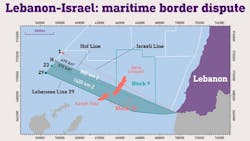Israel, Lebanon sign US-brokered maritime border deal
Offshore staff
NAQOURA, Lebanon – Israel and Lebanon have officially approved a historic United States-brokered agreement laying out their maritime boundary for the first time, which opens up the possibility for both countries to conduct offshore energy exploration.
As reported by Al Jazeera and other online sources, Lebanon’s President Michel Aoun signed a letter at the presidential palace on Oct. 27 that was expected to be submitted to US officials at Lebanon’s southernmost border point of Naqoura later that same day.
Top Lebanese negotiator Elias Bou Saab said the deal, which ends a long-running maritime border dispute in the gas-rich Mediterranean Sea, marked the beginning of a “new era.” Israel’s government also ratified the agreement on Oct. 27, a statement from Prime Minister Yair Lapid’s office said.
With the Lebanese economy in severe recession, Beirut reportedly sees the demarcation of the maritime border along Line 23 as an opportunity to unlock foreign investment and lift the country out of its spiralling economic crisis.
Lebanon’s foreign minister Abdallah Bou Habib told Al Jazeera that “the Lebanese people have great hope that their country will become a gas-producing country.” He noted, however, that it will take time for Lebanon to begin extracting gas and that gas reserves in its offshore reservoir have yet to be proven.
Bou Habib confirmed reports that the Lebanese government had awarded French oil firm TotalEnergies temporary control of a previously disputed offshore gas block. “TotalEnergies and its partners must start work in the areas agreed upon with the Lebanese government, namely block Number 9 in the Qana field,” he was quoted to have said.
Under the terms of the deal, Israel received full rights to explore the Karish field, which is estimated to have natural gas reserves of 2.4 trillion cubic feet (68 billion cubic meters).
In turn, Lebanon received full rights in the Qana field but agreed to allow Israel a share of royalties through a side agreement with the French company TotalEnergies for the section of the field that extends beyond the agreed maritime border.
Critics of the deal have said that it does little to address the issue of profit distribution but defers agreeing on what royalties Israel will get from the Qana field to a future date.
Al Jazeera’s Zeina Khodr, reporting from the Lebanon-Israel border, said that all parties had vested interest in the securing a deal at this point in time. “For Lebanon, this is about the economy. It is hoping that it can begin exploration for much-needed revenues, but many warn it will be years before it can reap the benefits,” she said.
Israel’s Lapid was instead looking for security guarantees, Khodr said, both to shore up support ahead of a general election on November 1 and “to increase production in Karish to get gas to Europe as an alternative to Russian gas.”
11.01.2022
